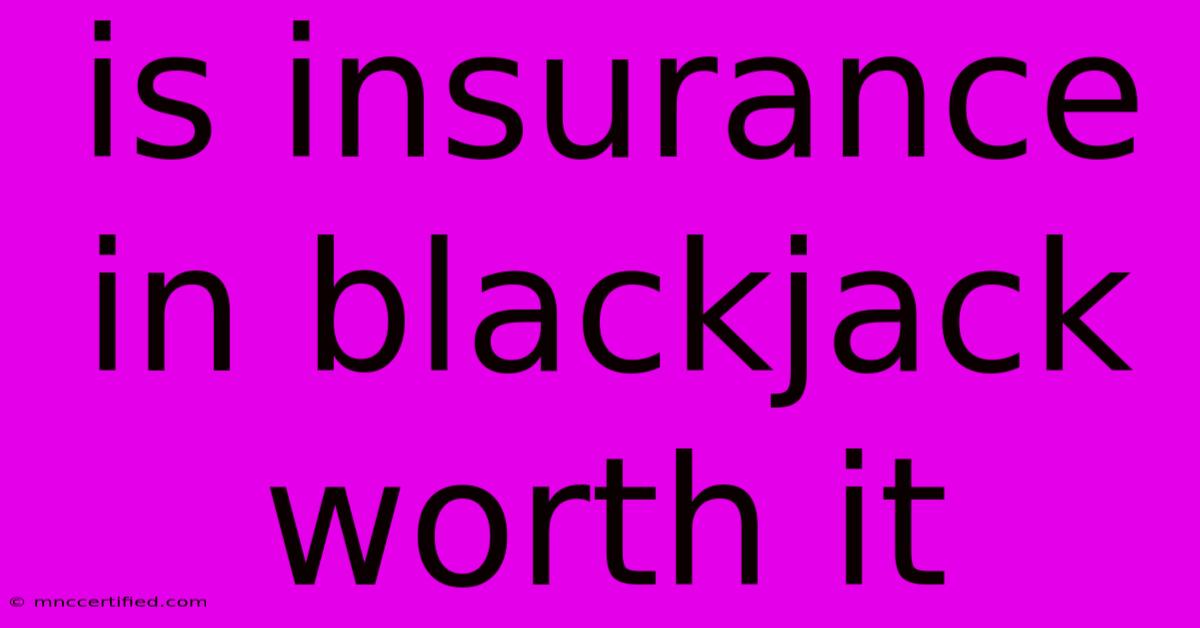Is Insurance In Blackjack Worth It

Table of Contents
Is Insurance in Blackjack Worth It? A Comprehensive Guide
Blackjack, a game of skill and chance, often presents players with the option of purchasing insurance. But is this seemingly protective bet actually worth the risk? The short answer is generally no, but understanding the nuances is crucial for making informed decisions at the table. This comprehensive guide delves into the mathematics and strategy behind blackjack insurance to help you determine if it's right for your game.
Understanding Blackjack Insurance
Insurance in blackjack is offered when the dealer's upcard is an Ace. It's a side bet, typically costing half your original wager, that the dealer has a natural blackjack (an Ace and a ten-value card). If the dealer does have a natural blackjack, your insurance bet pays out at 2:1. Sounds appealing, right? Let's break down why it often isn't.
The House Edge and Probability
The key to understanding insurance lies in probability. The odds of the dealer having a natural blackjack are approximately 7.5%. This means, in a perfectly balanced game, they get a natural about 7.5 times out of every 100 hands.
The payout of 2:1 seems attractive, but consider this: To break even, the dealer would need to have a natural blackjack more than 7.5% of the time; they would need to have it in roughly 1 in 13 hands, because that's the ratio to break even on a 1:2 bet. Since they have it closer to 1 in 13 hands, purchasing insurance is statistically disadvantageous.
This inherent probability imbalance creates a house edge for insurance, often significantly higher than the house edge on the main blackjack game itself. Therefore, taking insurance is generally a losing proposition in the long run.
When Might Insurance Seem Appealing? (And Why It Still Isn't)
Some players might consider insurance when they have a strong hand. The thought process is, "I'll lose my hand anyway, so I might as well hedge my bet." However, even with a strong hand, statistically, taking insurance is still a poor decision because of the high house edge. Your odds of winning the main hand are significantly better than winning the insurance bet.
Strategies to Avoid Losing Money on Blackjack
Instead of focusing on insurance, concentrate on improving your overall blackjack strategy. Here are some key elements:
- Basic Strategy: Learn and master basic strategy. This proven mathematical approach minimizes the house edge on your main bet. Numerous charts and apps are available online to help you learn.
- Card Counting (Advanced): Card counting is a more advanced technique that can give you a slight edge over the casino. However, it requires significant practice and is often frowned upon by casinos.
- Bankroll Management: Proper bankroll management is crucial. Set a budget and stick to it. Avoid chasing losses, and only gamble with money you can afford to lose.
Conclusion: Leave the Insurance Alone
While the allure of insurance in blackjack is understandable, the mathematical realities dictate that it's generally a losing proposition. Focus your efforts on mastering basic strategy and managing your bankroll. These are far more effective ways to improve your chances of winning at blackjack and enjoying a positive gaming experience. Remember, the casino always has an edge; smart play is about minimizing that edge, not chasing unlikely wins. By understanding the odds and focusing on proven strategies, you can significantly improve your overall blackjack experience.

Thank you for visiting our website wich cover about Is Insurance In Blackjack Worth It. We hope the information provided has been useful to you. Feel free to contact us if you have any questions or need further assistance. See you next time and dont miss to bookmark.
Featured Posts
-
Texas Remains Unbeaten Arkansas Game
Nov 17, 2024
-
Tulane Football Aac Championship Berth
Nov 17, 2024
-
England Vs South Africa Rugby Match Result
Nov 17, 2024
-
Sanders On Fetch Its Not Happening
Nov 17, 2024
-
Australia Beats Pakistan 2nd T20 I Highlights
Nov 17, 2024